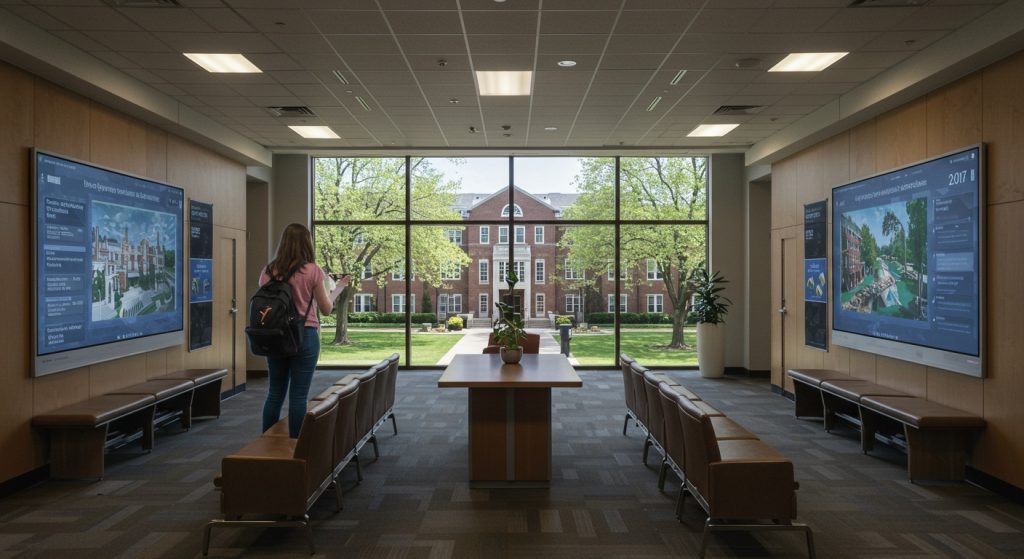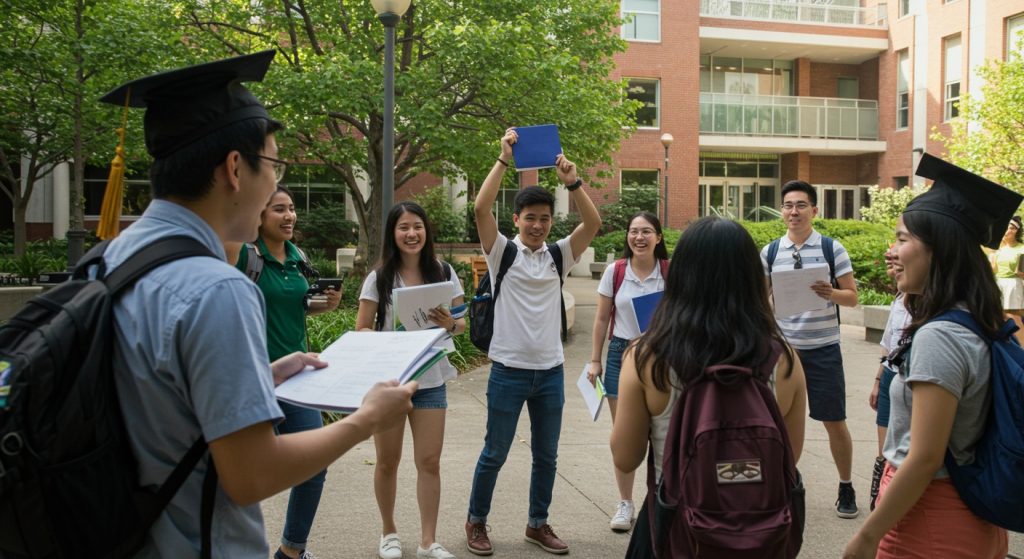Securing direct university admission increasingly hinges on mastering the interview, a critical juncture where genuine potential outweighs academic scores alone. Top institutions, from highly competitive medical schools to innovative computer science programs, now employ sophisticated interview strategies, often incorporating scenario-based questions, collaborative problem-solving, or even technical assessments via platforms like Zoom. Successful applicants grasp interviewers seek authentic intellectual curiosity, a demonstrated capacity for critical thought. A clear vision for contributing to the university community, moving beyond rote answers. Prepare to decode these evolving expectations, strategically articulate your unique narrative. Demonstrate the resilience and proactive engagement universities actively recruit in today’s dynamic academic landscape.

Understanding the Direct University Admission Interview Landscape
Navigating the path to higher education often involves more than just submitting stellar grades and a compelling personal statement. For many aspiring students, particularly those pursuing Direct Admission Options, the interview stands as a critical gateway. This isn’t merely a formality; it’s a dynamic conversation designed to delve deeper into who you are beyond your academic transcript. Universities utilize these interviews to assess qualities that aren’t easily quantifiable, such as your communication skills, critical thinking abilities, genuine interest. Overall fit with their institution’s values and culture.
Think of it as a two-way street. While the university is evaluating you, it’s also your prime opportunity to learn more about the program, the faculty. Student life from a direct source. It allows you to demonstrate your passion, articulate your motivations. Show that you’ve done your homework, moving beyond generic statements to demonstrate a truly informed decision. For many competitive programs or specific Direct Admission Options, a strong interview can be the deciding factor, elevating your application above others with similar academic profiles.
Pre-Interview Preparation: Laying the Groundwork for Success
Success in any interview, especially one as high-stakes as university admission, hinges significantly on thorough preparation. This isn’t about memorizing answers. Rather about building a robust foundation of knowledge and confidence that allows you to respond authentically and articulately.
- Deep Dive into the University and Program
- Articulating Your “Why”
- Anticipate Common Questions
- Practice, Practice, Practice
Go beyond the homepage. Explore the specific program curriculum, research interests of faculty members, student clubs, unique facilities. Recent news or achievements. Grasp the university’s mission statement and values. For instance, if you’re applying for an engineering program, research specific labs or projects you find exciting. Knowing these details allows you to tailor your answers and ask insightful questions, signaling genuine interest.
This is paramount. Why this university? Why this program? Why now? Connect your personal aspirations, academic interests. Career goals directly to what the university offers. If you’re pursuing Direct Admission Options, be clear about why this streamlined path aligns with your ambitions.
While you won’t know every question, many recur. Prepare thoughtful responses to inquiries like “Tell me about yourself,” “Why are you interested in this program?” , “What are your strengths and weaknesses?” , “How do you handle challenges?”. “Where do you see yourself in five years?”.
Rehearse your answers out loud. Record yourself, or better yet, do mock interviews with a trusted friend, family member, teacher, or career counselor. This helps refine your delivery, identify areas for improvement. Reduces nervousness. Focus on clarity, conciseness. Demonstrating enthusiasm.
As an admission expert once noted, “The best interviews feel like a natural conversation. That naturalness is almost always a result of meticulous preparation.”
During the Interview: Making a Lasting Impression
The interview itself is your stage to shine. It’s about more than just your words; your demeanor, engagement. Overall presence speak volumes. For Direct Admission Options, this face-to-face (or screen-to-screen) interaction can truly set you apart.
- Non-Verbal Communication is Key
- Eye Contact
- Body Language
- Active Listening
- Thoughtful and Authentic Responses
- Be Specific
- Be Honest
- Elaborate. Don’t Ramble
- Asking Insightful Questions
- Specific research opportunities or unique courses.
- Student support services or career development resources.
- The interviewer’s personal experience or perspective on the program/university.
- The typical day or week for a student in your prospective program.
- Handling Challenging Questions
Maintain consistent, comfortable eye contact to convey confidence and engagement. If it’s a virtual interview, look into your camera, not just at the screen.
Sit up straight, lean slightly forward to show interest. Avoid fidgeting. A natural smile can make you seem approachable and enthusiastic.
Pay close attention to the interviewer’s questions. Don’t interrupt. Nod occasionally to show you’re listening. Pause briefly before answering to collect your thoughts.
Instead of general statements, provide concrete examples from your experiences (academic projects, extracurricular activities, volunteer work) to illustrate your skills and qualities. For example, instead of saying “I’m a good leader,” describe a time you led a team project and the positive outcome.
Authenticity resonates. Don’t try to be someone you’re not. Interviewers are skilled at detecting insincerity.
Provide sufficient detail without going off-topic. Aim for answers that are comprehensive yet concise.
At the end of the interview, you’ll almost always be given an opportunity to ask questions. This is not a throwaway moment. Your questions demonstrate your intellectual curiosity and genuine interest. Avoid questions whose answers are easily found on the university website. Instead, ask about:
For instance, you might ask, “Could you tell me more about the interdisciplinary research opportunities available between the Computer Science department and the Robotics lab?”
Sometimes you’ll face questions designed to test your resilience, problem-solving skills, or self-awareness (“Tell me about a time you failed,” “What’s your biggest regret?”). Approach these with honesty, acknowledging the challenge. Then pivot to what you learned or how you grew from the experience. This demonstrates maturity and a growth mindset.
Common Interview Questions and How to Tackle Them
While every interview is unique, certain questions are staples. Preparing for these will boost your confidence and ensure you provide impactful answers relevant to Direct Admission Options.
- “Tell me about yourself.”
- Strategy
- Example
This is your elevator pitch. Focus on your academic journey, key achievements, passions relevant to your chosen field. How they connect to your interest in the university/program. Keep it concise, engaging. Forward-looking.
“I’ve always been fascinated by sustainable energy solutions, which led me to excel in my physics and chemistry courses. Even start an eco-club at my high school. My passion deepened when I interned at a local solar energy startup. I’m eager to bring this enthusiasm and practical experience to your Renewable Energy program, particularly given its strong focus on practical applications and research opportunities in carbon capture.”
- “Why this university/program?”
- Strategy
- Example
This is where your research shines. Be specific. Mention unique courses, faculty members whose work you admire, specific labs, campus culture, or alumni success stories that resonate with you. Connect it back to your personal and academic goals.
“Your university’s Biomedical Engineering program stands out to me because of its pioneering research in neural interfaces, particularly Dr. Smith’s work on prosthetic limb control. I’m also drawn to your strong co-op program, which I believe will provide invaluable real-world experience, aligning perfectly with my goal of contributing to medical device innovation.”
- “What are your strengths/weaknesses?”
- Strength Strategy
- Weakness Strategy
- Example (Weakness)
Choose strengths relevant to academic success and the program (e. G. , problem-solving, analytical thinking, collaboration). Provide a brief example.
Choose a genuine weakness. One that isn’t critical to the role. More importantly, discuss what steps you are taking to overcome it. This demonstrates self-awareness and a commitment to personal growth.
“I sometimes struggle with delegating tasks, preferring to do everything myself to ensure it’s perfect. But, I’ve been actively working on this by intentionally assigning responsibilities to group members in projects and trusting their abilities, which has improved our team efficiency and my own workload management.”
- “Where do you see yourself in 5 years?”
- Strategy
- Example
Show ambition but also realism. Connect your aspirations directly to the education you’d receive at their institution. It’s okay if your exact career path isn’t set. Demonstrate a clear direction.
“In five years, I envision myself working as a data scientist, ideally in a role that allows me to apply machine learning to solve real-world problems in healthcare. I believe the rigorous curriculum and hands-on projects in your Data Science program will equip me with the foundational skills and practical experience necessary to achieve this goal.”
- Behavioral Questions (e. G. , “Tell me about a time you worked in a team and faced a conflict.”)
- Strategy
- Example
Use the STAR method (Situation, Task, Action, Result). Briefly describe the situation, outline the task at hand, detail the actions you took. Explain the positive result or what you learned.
“
Situation: In my high school robotics club, we were building a competition robot. Two team members had very different ideas for the drive system, leading to a standstill.
Task: My role as team lead was to resolve the conflict and get us back on track.
Action: I called a meeting where each person could present their design idea and rationale without interruption. I then facilitated a discussion, pointing out the pros and cons of each and encouraging them to find common ground, perhaps by combining elements.
Result: We eventually merged their best ideas into a hybrid design that was more robust than either original concept. We successfully completed the robot on time, fostering better team collaboration moving forward.”
Post-Interview Etiquette: Sealing the Deal
The interview doesn’t end when you walk out the door or click “leave meeting.” The actions you take immediately afterward can reinforce your positive impression and demonstrate your professionalism, especially crucial for competitive Direct Admission Options.
- The Thank You Note
- Personalize it
- Reiterate your interest
- Proofread
- Following Up (If Appropriate)
- Reflecting on the Experience
This is non-negotiable. Send a personalized thank-you email within 24 hours of your interview.
Reference something specific you discussed during the interview (e. G. , “I particularly enjoyed our conversation about the research opportunities in the astrophysics department,” or “Thank you for clarifying the process for Direct Admission Options”).
Briefly restate your enthusiasm for the program and the university.
Ensure there are no typos or grammatical errors.
Generally, avoid excessive follow-ups. If the interviewer mentioned a specific timeline for decisions or asked you to send additional materials, then follow up accordingly. Otherwise, trust the process. Persistence is good. Pestering is not.
Take some time to reflect on how you felt the interview went. What questions did you answer well? Where could you improve for future interviews? This self-assessment is invaluable for personal growth, regardless of the outcome.
Conclusion
Your university interview isn’t merely an interrogation; it’s your unique stage to showcase authenticity and passion. Beyond rehearsed answers, remember that institutions, especially in today’s competitive landscape, are seeking genuine individuals who align with their ethos. For instance, in an era where virtual interviews are common, ensuring your tech setup is flawless – from lighting to a stable connection – is as crucial as knowing your subject. I’ve personally observed how a student’s thoughtful follow-up question, perhaps about a specific research project or a new interdisciplinary course, resonates far more than a generic query. This is your opportunity to articulate your “why” – why this university, why this course, why you. Don’t just recite achievements; connect them to your aspirations, demonstrating your potential contribution to their community. Embrace the chance to share your unique narrative. My personal tip: take a deep breath, make eye contact (even with the camera lens). Let your enthusiasm be palpable. Trust in the journey you’ve embarked upon; your distinct voice is your most powerful asset. Step forward with confidence, knowing you are ready to ace this.
More Articles
Unlocking University Funding: Your Ultimate Guide to Securing Scholarships and Grants
Online vs. On-Campus: Are Digital University Courses Truly More Affordable for Students?
Demystifying IIT Admissions: A Step-by-Step Guide to Navigating the Entire Process
Smart Strategies: Mastering Your University Living Expenses Budget for a Stress-Free Student Life
FAQs
What’s the big deal with these direct admission interviews?
These interviews are your chance to show universities who you are beyond your grades. They want to see your passion, critical thinking, communication skills. How well you’d fit into their community. It’s a two-way street to see if you’re a match and if the program aligns with your aspirations.
Okay, so how do I even start preparing for one?
Start by researching the university and your chosen program thoroughly. Grasp their values and what makes them unique. Practice articulating why you’re interested, what you bring to the table. How your experiences connect to your future studies. Also, anticipate common questions like ‘Why this major?’ or ‘Tell me about yourself.’
What kind of questions might they throw at me?
They won’t be ‘weird’ but might be thought-provoking. Expect questions about your academic interests, career goals, extracurricular activities. How you handle challenges. They might also ask for your opinion on current events related to your field or present a hypothetical problem to solve. The goal is to see your reasoning, not just memorized facts.
Any tips for making a super good impression?
Definitely! Be punctual, dress appropriately (smart casual usually works). Maintain good eye contact. Listen carefully to the questions and take a moment to formulate your thoughts. Be genuine, enthusiastic. Confident. Not arrogant. A warm smile and polite demeanor go a long way.
What if I totally blank out or don’t know an answer?
Don’t panic! It’s okay to say, ‘That’s an interesting question, let me think for a moment.’ If you truly don’t know, be honest. You could say, ‘I’m not familiar with that specific topic. Based on what I do know, I would approach it by…’ or offer to research it. They appreciate honesty and your ability to think on your feet.
Should I ask them anything back at the end?
Absolutely, yes! Always have a couple of thoughtful questions prepared for the interviewer. This shows your genuine interest and engagement. Ask about specific program aspects, student life, research opportunities, or anything that demonstrates you’ve done your homework and are serious about attending. Avoid asking questions you could easily find on their website.
How crucial is body language during the interview?
Very vital! Your body language speaks volumes. Sit up straight, avoid fidgeting. Use open gestures. A firm handshake (if in person) and maintaining eye contact (or looking at the camera if virtual) convey confidence and attentiveness. It shows you’re engaged and respectful of the conversation.



